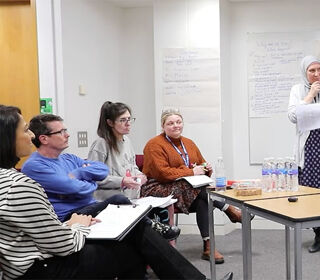
Blog

Social workers often work with different professionals to ensure their job is done effectively, and the best and most effective support can be offered to families and individuals.
Students were given the opportunity to attend a mock child protection conference led by real industry professionals, to gain first-hand experience of something they are likely to undertake within their career as a social worker.
What was the event?
In order to support our students to develop the skills needed to work across different professional teams, Social Work staff organised a mock child protection conference led by real industry professionals. This gave students first-hand experience of something they are likely to undertake within their career as a social worker.
The day involved students attending a simulated child protection conference, where professionals effectively modelled team working, communication and relationship building skills. The experience provided opportunities to observe the process of a child protection conference where a restorative approach was used to engage parents and professionals. This involved a discussion and focus on strengths of the parents, whilst also considering areas of risk and need. Students witnessed how various professionals and parents contributed to discussions.
How do Social Workers work with other professions?��
Social workers use a range of important skills when working with citizens, including communication, observation, listening, interviewing, assessment and partnership skills. Social workers also interact with colleagues from other professions in multi-disciplinary teams and so need team working skills to effectively collaborate, interact and develop connections. They liaise and work in partnership with a number of professionals in practice including the police, school nurses, health visitors among many others.��
Social Work Courses
Find out more about our courses
What are the benefits of working collaboratively?
Working collaboratively provides many opportunities including a better mix of skills and expertise, increased responsiveness, improved efficiency, information sharing and opportunities for innovation and creativity to name a few. Conversely, problems can arise in practice such as issues with professional hierarchies, lack of clarity on professional roles and responsibilities, differing professional values and language barriers. It would be very useful for students to obtain a realistic experience of what it would be like to work in a multi-disciplinary team and become familiar with some of these issues in preparation for practice.
Student feedback
Social Work students provided positive feedback following the experience, commenting: “I appreciated and learnt a lot from watching, analysing and discussing the conference, not only from a professional and academic perspective, but also personally. The role play highlighted how a child protection meeting might run which I found more intriguing compared to a description of what a meet is like.”
A Specialist Community Public Health Nursing student said: “The session was entertaining. The most useful part of the session for me was being able to discuss how different professionals reach their decisions and what they took from the information presented. It was also fascinating to see that some of the exploration was the same between professionals. Hearing the opinions about the same information was eye-opening. Hearing the expert voice in a training exercise rather than a live event was also useful to be able to understand the reason behind concerns, rather than relying on theory.”